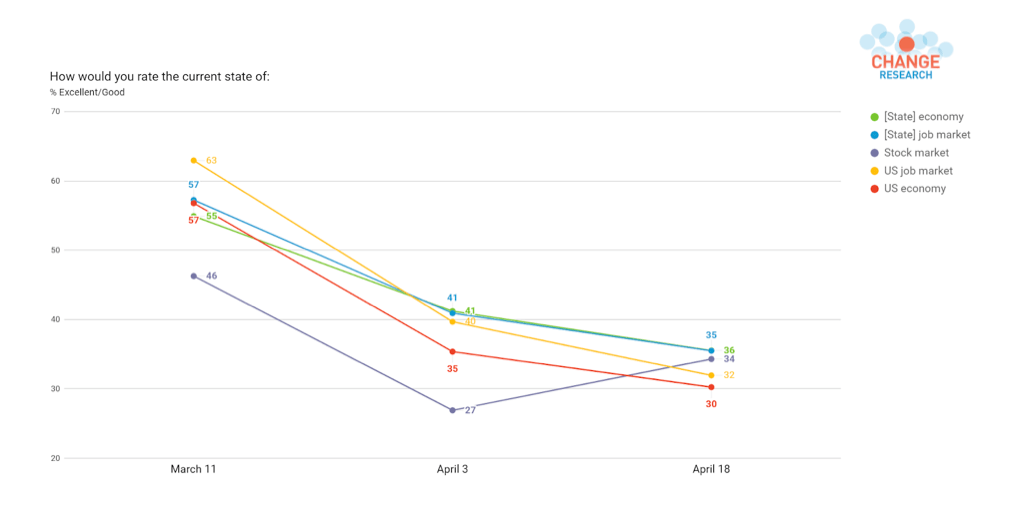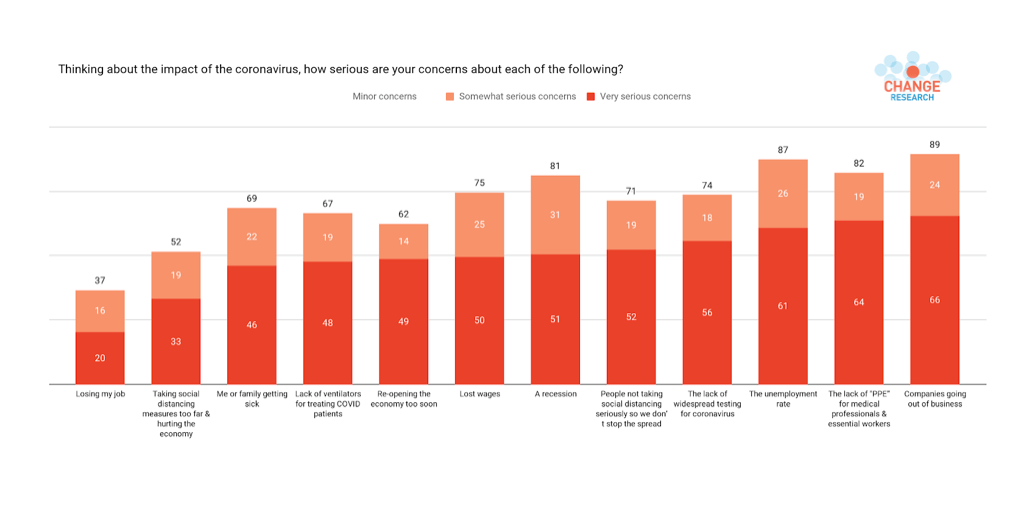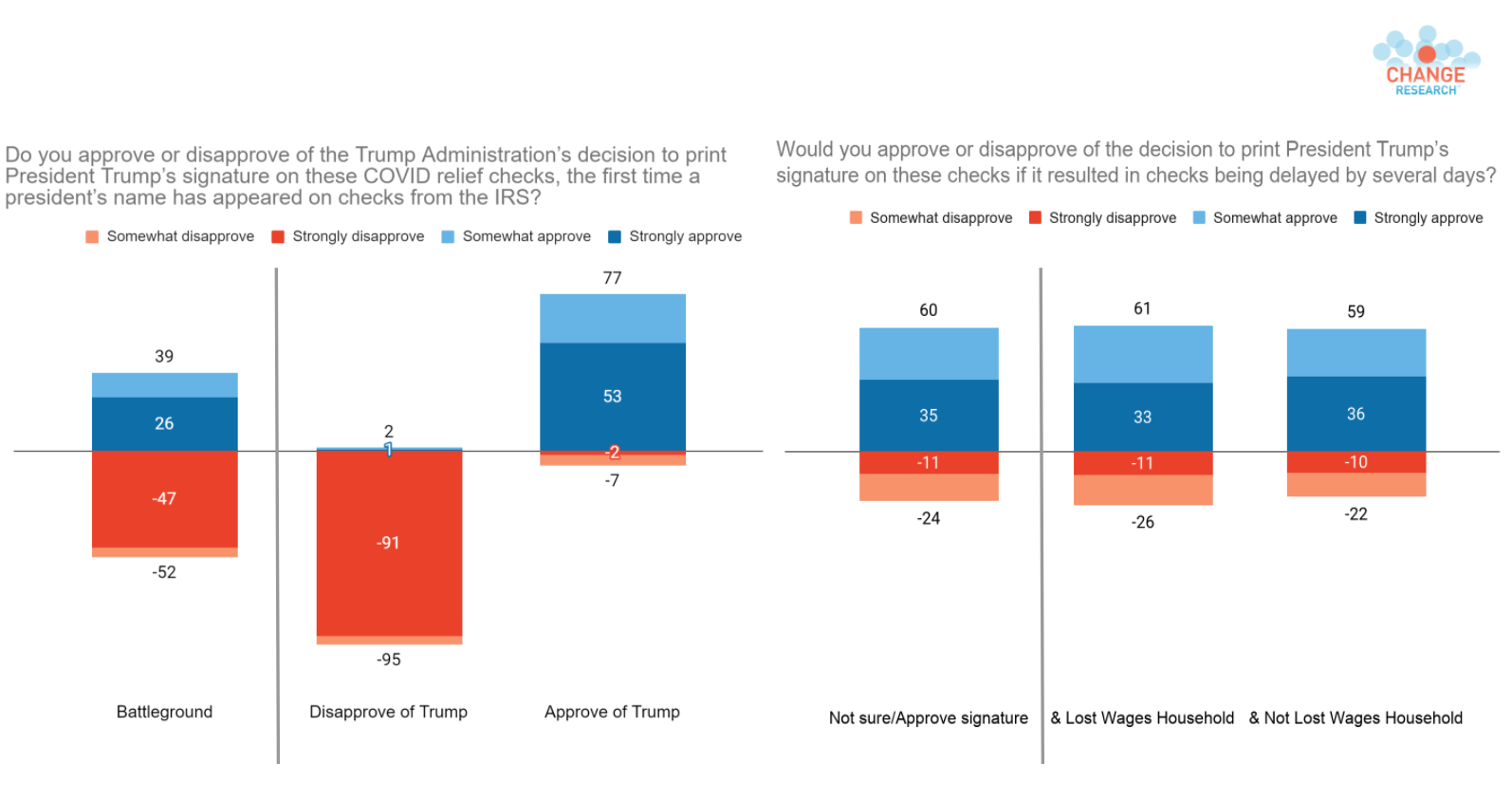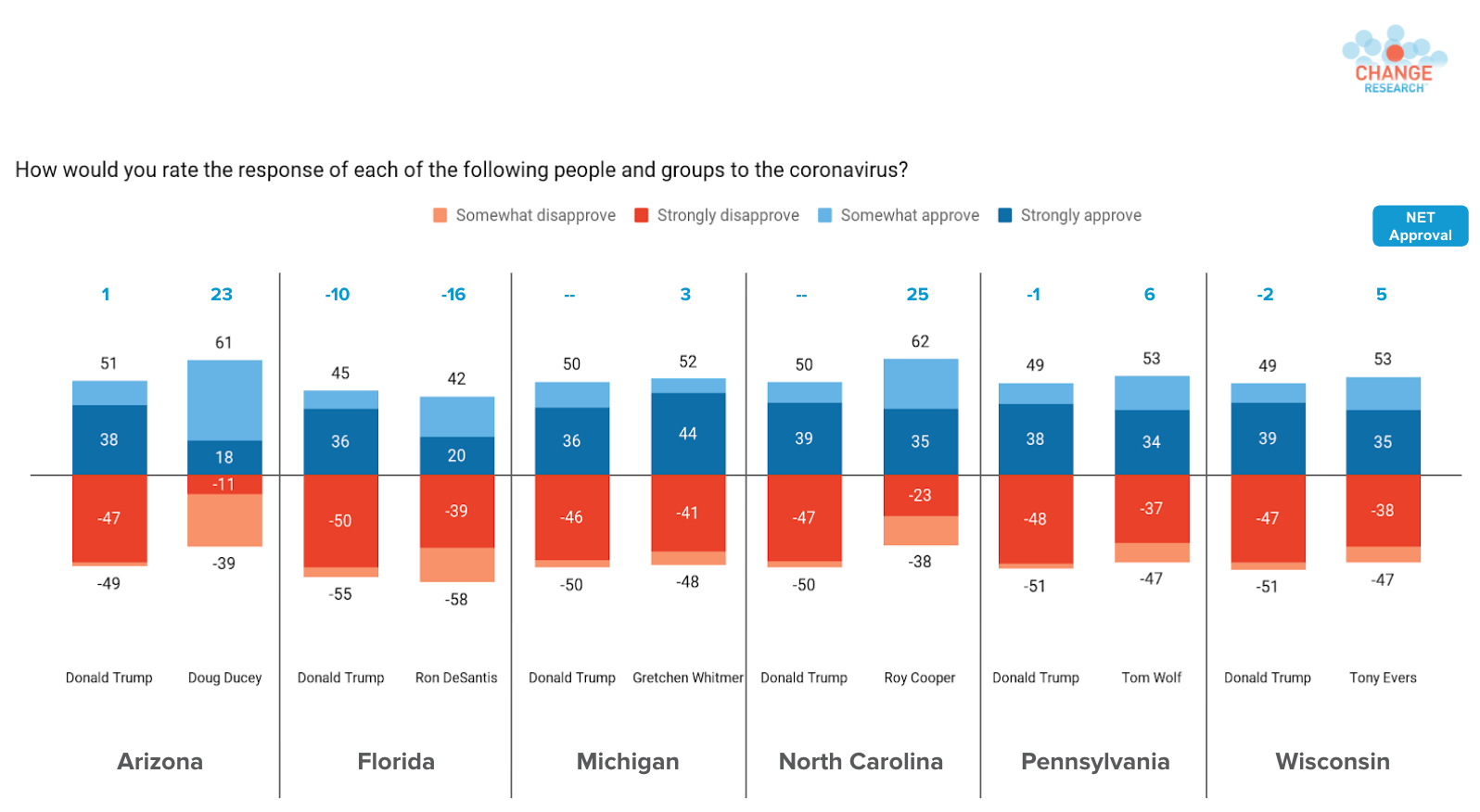CNBC/Change Research Poll in Arizona, Florida, Michigan, North Carolina, Pennsylvania, and Wisconsin: April 17-18, 2020
Key Takeaways
- Voters in battleground states are still more concerned about the impact of COVID-19 on health and safety (72%) than the impact on their personal finances (28%). 71% have serious concerns that people will not take social distancing seriously enough to stop the spread.
- Ratings of the economy and the US job market continue to fall, with over half of voters in battleground states (52%) saying that they or someone in their household has lost wages as a result of the coronavirus.
- With the exception of Florida, voters approve of their governor’s response to coronavirus more than President Trump’s response. Trump is the least trusted leader to make decisions about reopening the economy. Voters trust scientists and medical professionals including Dr. Fauci to make those decisions.
The latest Change Research-CNBC ‘States of Play’ poll of likely 2020 voters in the competitive battleground states of North Carolina, Arizona, Pennsylvania, Michigan, Wisconsin, and Florida finds Americans struggling with the health and economic impacts of the COVID pandemic. Below are the key findings.
The economic impact of COVID deepens
In the battleground, 70% of voters rate the US economy poor/not so good, a 5-point increase since April 3, and 68% of battleground voters rate the US job market negatively, an 8-point increase.
Over half of voters in battleground states (52%) say that they or someone in their household has lost wages as a result of the coronavirus, and 38% in the battleground states report that they or someone in their household has lost a job or been furloughed.
COVID relief payments have reached about half of battleground voters (46%). Another 37% anticipate receiving one in the future. 29% of voters say they are less than a month away from being unable to afford housing, food and essentials if they were to lose a job. Less than half of those who have lost a job or been furloughed have been able to successfully apply for unemployment benefits (44%).

Voters prioritize health over the economic impact
Though voters’ concerns about the coronavirus have declined, three-quarters of voters are still seriously concerned about the outbreak. 46% of voters now personally know someone who has contracted the virus, and a 45% plurality say things are still getting worse.
Voters are also still more concerned about the impact of coronavirus on their family’s health and safety (72%) than the impact on their financial situation (28%), a 10-point shift since we last surveyed.
While voters expressed greater concern that people are taking social distancing measures too far compared to two weeks ago (42% expressing serious concerns two weeks ago, 52% now), three-quarters of battleground voters still support social distancing measures. Voters are far more concerned about people not taking social distancing seriously (71% serious concerns), re-opening the economy too soon (62%), and the lack of widespread testing (74%).

Voters trust governors, scientists, medical professionals more than Trump on COVID-19
Donald Trump continues to earn a negative grade for his handling of COVID (52% disapprove, 48% approve) .
The majority of battleground voters disapprove of the Trump Administration’s decision to print President Trump’s signature on COVID relief checks (39% approve, 52% disapprove). They are split over his decision to halt funding to the World Health Organization (50% approve, 49% disapprove).

President Trump is also the least trusted to make decisions about reopening the economy. Across every state in our battleground, state and local governments are more trusted to make those decisions – and with the exception of Ron DeSantis, governors – including the Democratic governors that Trump has been criticizing – earn better marks for their handling of coronavirus.

Battleground Sample & Methodology
National Companion Survey Toplines
National Companion Survey Sample & Methodology
For media inquiries, please email [email protected]
Change Research conducted a poll of 5,787 likely voters April 17-18 across 6 competitive battleground states: Arizona, Florida, Michigan, North Carolina, Pennsylvania, and Wisconsin. A companion national survey of 1,178 likely voters was also conducted April 17-18, 2020. Unless otherwise stated, the results presented in this analysis are among battleground state voters. The margin of error, as traditionally calculated, is ±1.2% for the battleground and ±2.9% for the national poll. Change Research reaches voters via targeted online ads that point people to an online survey instrument. Our Dynamic Online Sampling establishes and continuously rebalances advertising targets across region, age, gender, race, and partisanship to dynamically deliver large samples that accurately reflect the demographics of a population. Post stratification was done on state, gender, age, race, education, and 2016 presidential vote.
This is the third in a series of bi-monthly battleground state and national surveys that CNBC & Change Research will conduct in 2020. The first wave was conducted March 9-11 among 2,483 likely general election voters in the battleground (MOE ± 2.0%) and among 1,541 interviews likely general election voters nationally (MOE ± 2.5%). The second wave was conducted April 2-3 among 2,448 likely general election voters in the battleground (±2.0%) and among 1,200 likely general election voters nationally (MOE ±2.8%).
